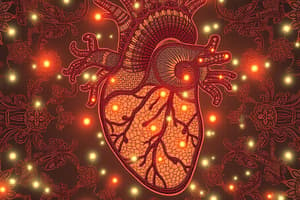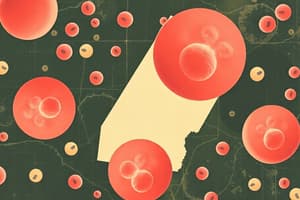Podcast
Questions and Answers
What is one common symptom of congestive heart failure?
What is one common symptom of congestive heart failure?
- Shortness of breath (correct)
- Weight loss
- Elevated blood pressure
- Chest pain
Which of the following risk factors significantly increases the likelihood of developing congestive heart failure?
Which of the following risk factors significantly increases the likelihood of developing congestive heart failure?
- High fiber diet
- Hypertension (correct)
- Sedentary lifestyle
- Pregnancy
Which of the following is NOT a factor contributing to higher incidence of pneumonia in the elderly?
Which of the following is NOT a factor contributing to higher incidence of pneumonia in the elderly?
- Lowered resistance to infections
- Reduced sensitivity of pharyngeal reflexes
- Poor chest expansion
- High physical activity levels (correct)
What is a common diagnostic procedure for pneumonia?
What is a common diagnostic procedure for pneumonia?
Which nursing diagnosis is related to altered oxygen supply in respiratory issues?
Which nursing diagnosis is related to altered oxygen supply in respiratory issues?
Which symptom is associated with bacterial pneumonia?
Which symptom is associated with bacterial pneumonia?
What is a main management strategy for pneumonia in the elderly?
What is a main management strategy for pneumonia in the elderly?
Which nursing diagnosis involves decreased energy and secretion-related obstruction?
Which nursing diagnosis involves decreased energy and secretion-related obstruction?
What is the first symptom of coronary artery disease in older adults?
What is the first symptom of coronary artery disease in older adults?
Which of the following management strategies is most appropriate for stable angina?
Which of the following management strategies is most appropriate for stable angina?
What is the correct sequence of steps to follow while awaiting emergency treatment for a myocardial infarction?
What is the correct sequence of steps to follow while awaiting emergency treatment for a myocardial infarction?
Which nursing diagnosis is related to decreased pumping ability of the heart?
Which nursing diagnosis is related to decreased pumping ability of the heart?
What symptom might indicate a knowledge deficit related to coronary artery disease?
What symptom might indicate a knowledge deficit related to coronary artery disease?
What is a common nursing diagnosis related to hypertension in older adults?
What is a common nursing diagnosis related to hypertension in older adults?
Which of these lifestyle modifications is NOT recommended for stable angina management?
Which of these lifestyle modifications is NOT recommended for stable angina management?
What is a characteristic presentation of angina?
What is a characteristic presentation of angina?
Which of the following is a risk factor for hypertension in older adults?
Which of the following is a risk factor for hypertension in older adults?
What is the most critical aspect of management for postural hypotension in older adults?
What is the most critical aspect of management for postural hypotension in older adults?
Which of the following is a risk factor for increased myocardial infarction in older adults?
Which of the following is a risk factor for increased myocardial infarction in older adults?
Which of the following assessments may indicate severe hypertension?
Which of the following assessments may indicate severe hypertension?
What nonpharmacologic management strategy is effective for hypertension?
What nonpharmacologic management strategy is effective for hypertension?
What is a consequence of untreated postural hypotension in older adults?
What is a consequence of untreated postural hypotension in older adults?
Which of the following symptoms is commonly associated with congestive heart failure?
Which of the following symptoms is commonly associated with congestive heart failure?
What lifestyle change can significantly help manage hypertension?
What lifestyle change can significantly help manage hypertension?
Flashcards are hidden until you start studying
Study Notes
Congestive Heart Failure
- Occurs in 10 out of every 1,000 people over the age of 65
- Risk factors:
- Hypertension: risk doubles for blood pressures above 160/90
- Diabetes Mellitus
- Coronary Artery Disease (CAD)
- Renal Disease
- Myocardial infarction: CHF frequently develops within 6 years after a heart attack
Congestive Heart Failure Symptoms:
- Shortness of breath
- Edema
- Coughing or wheezing
- Fatigue
- Lack of appetite or nausea
- Confusion
- Increased heart rate
- Atypical signs:
- Decreased appetite
- Weight gain of a few pounds
- Insomnia
Pneumonia
- An infection in the lungs that can be caused by bacteria, viruses, and aspiration.
- Leading cause of death among the elderly
- Incidence among individuals aged 71-85: 50 per 1,000 people per year
Factors Contributing to Higher Incidence of Pneumonia in the Elderly:
- Poor chest expansion and shallow breathing
- Lowered resistance to infections
- Reduced mobility and debilitation
- Reduced sensitivity of pharyngeal reflexes
Pneumonia Diagnostics:
- Chest x-ray
- Complete blood count
- Sputum culture
- History taking
Pneumonia Assessment:
- Crackles may be heard in the lungs through auscultation
- Chest pain with shortness of breath
- Viral symptoms
- Fever
- Nonproductive hacking cough
- Muscle pain
- Weakness
- Shortness of breath
Pneumonia Assessment:
- Bacterial symptoms
- Chills
- Chest pain
- Sweating
- Productive cough
- Dyspnea
- Confusion
Pneumonia Nursing Diagnosis:
- Ineffective airway clearance related to decreased energy and tracheobranchial inflammation/obstruction/secretion
- Impaired gas exchange related to altered oxygen supply and alveolar-capillary membrane changes
- Ineffective breathing pattern related to respiratory muscle fatigue
Pneumonia Management:
- Rest
- Increase oral fluid intake
- Medications: Antipyretics, Antibiotics, Antitussive, Bronchodilators
- Chest physiotherapy
- Report signs of respiratory complications
- Pneumonia and Flu vaccine for individuals over 65
Coronary Artery Disease:
- Leading cause of death and disability in women over 40 years old
- Approximately 1 in 2 women will die from CAD
- Women experience more epigastric pain and shortness of breath than chest pain
Coronary Artery Disease Management:
- Angioplasty
- Coronary artery bypass graft
- Oxygen therapy
- Pharmacologic:
- Beta-blockers
- ACE inhibitors
- Antihypertensives
- Cardiac rehabilitation program
Angina:
- The first symptom of CAD in older adults
- Often occurs with exercise or stress and is relieved by rest and/or nitroglycerin
- Chest pain is generally shorter (less than 5 minutes) than MI
- Classic presentation: squeezing pain or pressure in the sternal area (Levine's Sign)
Angina Assessment:
- Dyspnea
- Dizziness
- Confusion
- Most times the older adult does not have typical chest pain
Angina Management:
- Unstable angina: may require hospitalization
- Stable angina: medication and lifestyle modifications
- Weight management
- Stress management
- Limiting caffeine
- Smoking cessation
- Exercise regimen based on myocardial capacity
- Control of hypertension
Myocardial Infarction:
- Risk increases with age
Myocardial Infarction Steps to Follow Awaiting Emergency Treatment:
- Have the patient rest
- Provide supplemental oxygen
- Give nitroglycerin sublingually every 5 minutes times three and monitor vital signs
- Give aspirin if not contraindicated
Hypertension:
- "Silent killer"
- Systolic blood pressure increases to a greater extent than diastolic blood pressure.
- Isolated systolic hypertension (ISH): most common form of hypertension in older people
Hypertension Risk Factors:
- Lipid abnormalities
- Diabetes mellitus
- Body mass index
- Smoking
- Atrial fibrillation
- Left ventricular hypertrophy
- Alcohol and diet
- Exercise
Hypertension Assessment:
- Asymptomatic - majority
- Early indicators:
- Fatigue
- Headache
- Epistaxis
- Dizziness
- Severe hypertension:
- Throbbing occipital headache, prevalent in the morning
Hypertension Nursing Diagnosis:
- Knowledge deficit: Hypertension and self-care management related to new diagnosis and interventions
- Ineffective individual coping related to perceived limitations to diagnosis
- Ineffective management of therapeutic regimen
- Altered nutrition: more than body requirement related to high fat, caloric, and sodium intake
Hypertension Management:
- Nonpharmacologic:
- Weight loss
- Salt restriction
- Increasing potassium intake
- Reducing alcohol intake
- Exercise
- Vitamin C
Hypotension (Postural):
- Decline in systolic pressure of 20 mm Hg or more after rising and standing for 1 minute
- Causes:
- Increased intake of vasoactive medications
- Age-related changes such as blunting of the baroreflex-mediated heart response to hypotensive and hypertensive stimuli
- Can lead to serious consequences for older persons such as falls, stroke, syncope, and coronary complications
Hypotension Management:
- Get out of bed slowly and in stages
- Sleep with the head of the bed elevated several inches
- Have a daily fluid intake of 2 to 3 liters.
- Avoid hot showers or baths.
- Avoid straining at stool.
- Exercise regimen must be recommended by the physician.
- Avoid prolonged standing.
Studying That Suits You
Use AI to generate personalized quizzes and flashcards to suit your learning preferences.




